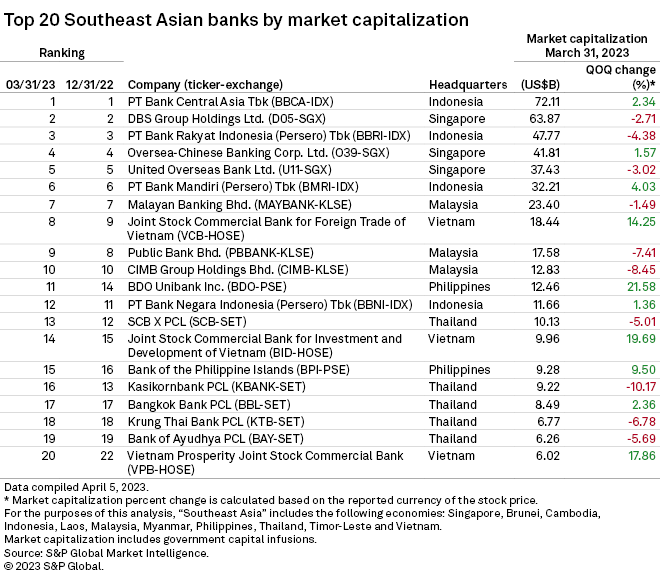S&P Global Offerings
Featured Topics
Featured Products
Events
S&P Global Offerings
Featured Topics
Featured Products
Events
S&P Global Offerings
Featured Topics
Featured Products
Events
Banking & Capital Markets
Economy & Finance
Energy Transition & Sustainability
Technology & Innovation
Podcasts & Newsletters
Banking & Capital Markets
Economy & Finance
Energy Transition & Sustainability
Technology & Innovation
Podcasts & Newsletters
S&P Global Offerings
Featured Topics
Featured Products
Events
24 Apr, 2023
By Ranina Sanglap and Marissa Ramos
Increased foreign inflows helped Indonesian banks cement their position among the biggest banks in Southeast Asia by market capitalization during the first quarter.
PT Bank Central Asia Tbk took the top spot on S&P Global Market Intelligence's list of the top 20 Southeast Asian banks by market cap. The bank's capitalization increased 2.34% quarter over quarter to $72.11 billion in the January-to-March period. Three other Indonesian banks — PT Bank Rakyat Indonesia (Persero) Tbk, PT Bank Mandiri (Persero) Tbk and PT Bank Negara Indonesia (Persero) Tbk — were in the top 20, with Bank Rakyat Indonesia in the third spot, the data shows.
"There has been increasing foreign inflows to Indonesia following reopening and economic recovery. The banks are a key proxy to this recovery, and the bigger banks are likely enjoying flight-to-quality flows," Thilan Wickramasinghe, head of research for Singapore and head of regional financials at Maybank Investment Banking Group, told Market Intelligence via email.

Lenders such as Bank Central Asia are "delivering strong profitability metrics, including record earnings in fiscal 2022," Wickramasinghe said. These strong metrics are positioning Indonesia's banks as a better offering amid global banking uncertainty, Wickramasinghe added.
Indonesia's economic growth remains "solid" on the back of increasing domestic demand and gains in exports, the nation's central bank said April 18 as it held its monetary policy steady. The rupiah has regained part of its prior losses, rising 5.26% since the start of 2023, exceeding other Asian currencies, Bank Indonesia noted. Foreign direct investment in Indonesia increased 44.2% year over year in 2022, Reuters reported Jan. 24, citing the country's investment minister, Bahlil Lahadalia.
Singaporean banks made up the rest of the top five biggest banks by market cap in the region. However, only Oversea-Chinese Banking Corp. Ltd. saw an increase in its market cap. The market cap of both United Overseas Bank Ltd. and DBS Group Holdings Ltd. declined quarter over quarter.
"As developed market banks with larger exposure to investment securities on their balance sheets compared to the rest of Southeast Asia, they are likely to have been impacted by increased fears of contagion following the pressure on US regional banks and the rescue to Credit Suisse," Wickramasinghe said.
Vietnamese gains
Three Vietnamese banks on the region's list of the top 20 saw gains in their market cap, with Joint Stock Commercial Bank for Foreign Trade of Vietnam's market cap increasing 14.25% quarter over quarter to $18.44 billion. Joint Stock Commercial Bank for Investment and Development of Vietnam saw a 19.69% increase in market cap to $9.96 billion and Vietnam Prosperity Joint Stock Commercial Bank's market cap rose 17.86% to $6.02 billion.
"Over the quarter, the government has released several policies to ease the pressure and protect the banking system," Thao Ngoc Nguyen, an analyst at Viet Dragon Securities Corp., told Market Intelligence via email. "Furthermore, banking is the industry that's able to maintain earnings growth in 2023 while others might lose growth momentum, hence many funds continue allocating their money to this industry," Nguyen said.
Additionally, Vietnam saw increased foreign buying, "partly supported by a relief rally as constructive government action on the property sector was viewed as having a positive impact on easing asset quality risks," Maybank's Wickramasinghe said.
Vietnam's foreign direct investment reached $27.72 billion as of Dec. 20, 2022, up 89% from the same period in 2021, according to the Ministry of Planning and Investment. The capital generated by foreign direct investment projects for the period was estimated at $22.4 billion, an increase of 13.5% year over year, the ministry said.
